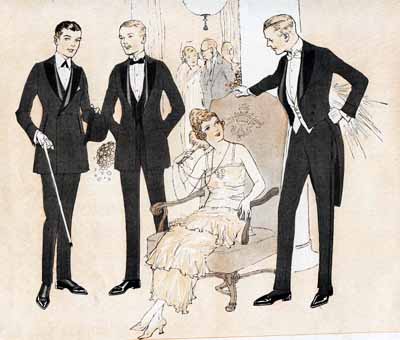
|
Article from THE DESIGNER, October 1914
October! What magical pictures
the very word conjures up! The wondrous beauty of the gold-brown woods, the lazily curling smoke, the laden
vines, the ruddy orchards! What a marvelous time is autumnthe very sunset of the season, so to speak. And, to
get down to earth, the time for a much-needed overhauling of the wardrobe. Just as the cooler weather is being
welcomed, New York’s fashionable set begins to return to the city. Theaters and concerts are soon in full
blast and the gay night life of the metropolis gradually reaches its height. And that means a careful
inspection of one’s full evening-dress suit. In metropolitan centers, and particularly since the
popularity of the modern dances, opportunities for seeking night amusement have increased enormously, and men
who have never paid much attention to their clothes are now everywhere seeking for scrupulous correctness in
evening wear.
The dancing craze, more than any other one thing, is responsible for this. A man becomes more conspicuous when
dancing than he is usually accustomed to, and of course has no desire to be the target for critical comment
from spectators. Hence the numerous inquiries at the stores for "the right kind of shirts; the correct pumps;
the right waistcoat," and so on. I have heard queries like these from men who once prided themselves on their
democratic independence by refusing to put on a dress suit at all. Surely evening dress has come into its own
at last. The design shown on this page may be considered as reflecting to-day’s mode in every detail. It is
smart, trim, plain and conventionally correct. No man should ever allow himself latitude in connection with his
evening clothes. Conventionally correct and simple should be the only effect desired. A man may be permitted to
express his individual preferences regarding almost anything he wears, but when it comes to evening clothes let
him conform readily to established conventions and avoid the freakish or unusual. Full evening dress is one
thing in which a man either looks his best or his worst, and in wearing it every man would do well to adopt the
new slogan of the railroads: Safety First! Follow recognized standards and do not attempt originality where
formality is the desired end.
Fashion now permits a black silk waistcoat to be worn with full evening dress, although most men give
preference to white linen or cotton. It is a strange vagary that, although a black silk waistcoat is considered
good form, a black waistcoat of the same material as the coat itself is not allowable under any circumstances.
I discussed the question of the correct shirt to be worn with evening dress so thoroughly last month that I
need not say anything more just now on that important subject. The collar worn with full evening dress may be
either a straight poke (like that illustrated) or a wing. The smartly dressed New Yorkers, and particularly of
the younger set, give decided preference to the one shown on this page. And please remember that the double-
fold collar is not to be worn with formal evening clothes. It is considered good enough with a Tuxedo,
but a little too "careless" with a full-dress suit.
Frequently it is the amount of attention we pay or do not pay to details that makes us look well-dressed or
otherwise. Take ties, for instance. A man may be correctly dressed from top to toe, and yet have on a necktie
that puts everything else out of harmony. You may think that a white evening bow is a white evening bow and
nothing more, but I would strongly advise my readers to pay as much attention to the selection of their evening
ties as they would to the purchase, say, of their silk hats. Do not buy bulgy, thick, wide bows. Do not have
them too long. Tie them yourself, of course, and in doing so draw them tight at the center to gain that trim
neatness that is so desirable. It is really not difficult to tie your own bows properly. Have your wife,
mother, sister, or someone else’s sister show you how to do it. Most women are adept at this sort of
thing.
The correct gloves for evening wear are white kid with "self-stitching." Do not be persuaded to buy white
gloves with black stitching as "something new."
According to the different occasions, you will need pumps, low patent shoes or button shoes to wear with
your evening suit. Naturally you will wear pumps for dancing, and as a matter of fact they will be found correct for most occasions.
Socks should be black silk or lisle, although very dark blue makes a pleasant variation at times.
Study very carefully what the chart says regarding the wearing of jewelry. Beyond the merest necessities, such
as links and studs, you would do well to wear no jewelry at all. The day for fobs, chains, diamonds, etc., has
gone, and the less conspicuous you make yourself the more harmonious you will appear.
A high silk hat with a two-inch black band is correct nowadays for evening wear.
THE DESIGNER, October 1914
|


